♀️ The Trailblazing Women of Wall Street
Women have long shaped Wall Street—even when history tried to write them out.



With the anniversary of the horrific events of September 11th this week, we thought it would be appropriate to find some of the memorials and shrines in New York City where visitors can pay respects and view a live historical artifact from that somber day.
The World Trade Center site looks nothing like it did five or ten years ago; heaps and tons of metal have been removed from the wreckage. These artifacts were stored in the 80,000 square-foot Hangar 17 in John F. Kennedy Airport, where they were cut and sorted to be sent out, filling hundreds of requests from around the world to have a piece of the hallowed material for shrines and memorials.
The 9/11 Memorial Museum at the World Trade Center is a new repository for many more artifacts, giving visitors a chance to learn even more about the buildings that once stood at that very place. But even if you haven’t gotten to the museum yet, here are some of our favorite public spaces, parks, and memorial sites where you can find a real piece of the original towers, or simply pay your respects.
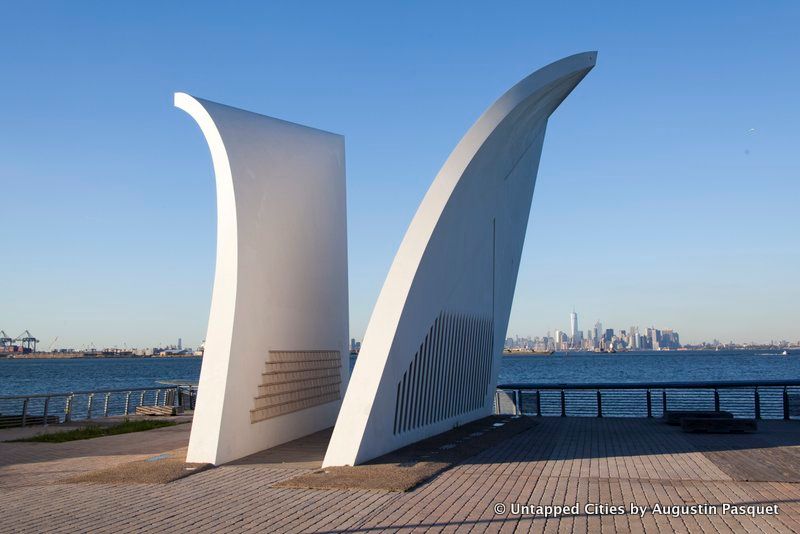
This work, entitled Postcards, is located on the North Shore Waterfront Esplanade on Staten Island. By architect Masayuki Sono, the wing-like structures also feature 274 plaques with those lost on 9/11. The sculpture is oriented exactly towards where the Twin Towers once stood – stand between the two wings when you visit. Postcards will soon be joined by much more company: The New York Wheel, the world’s tallest ferris wheel is currently under construction, as is much of the area around the St. George Ferry Terminal.
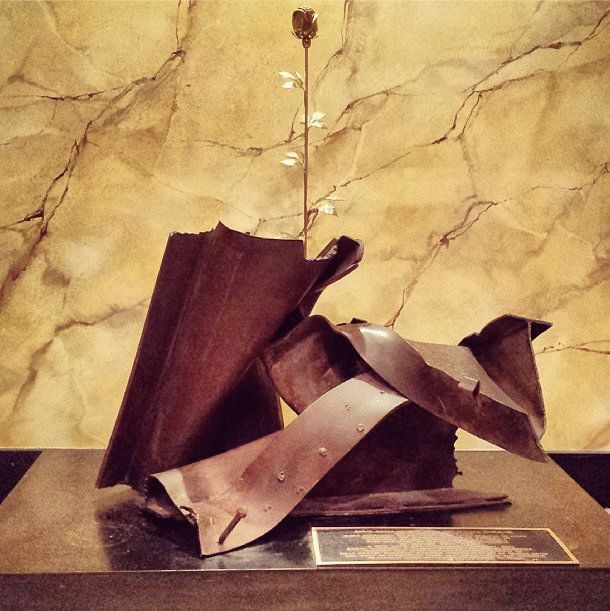
Photo by g1g1_nyc
These little known 9/11 Memorials are located inside the Church of St. Francis of Assisi on 31st Street between 6th and 7th Avenue. Three pieces of steel recovered from the World Trade Center site are displayed in front of a stained glass window commemorating those lost, which included Friar Michael Judge, chaplain of the FDNY and Carol LaPlante, a secular Franciscan.
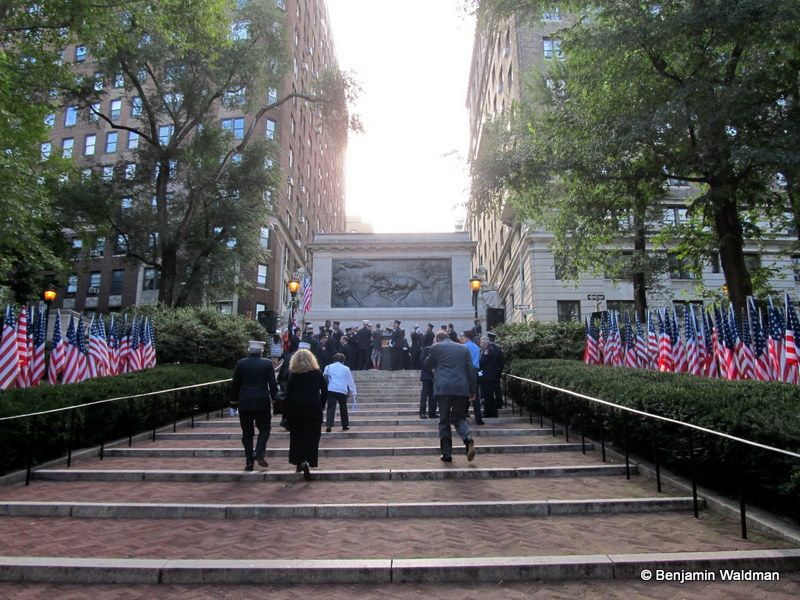
Although the Firefighter’s Memorial, located at 100th Street and Riverside Drive, was dedicated in 1913, for the past ten years it has served as a place for families and fellow firefighters to remember the 343 comrades who perished on September 11th 2001.
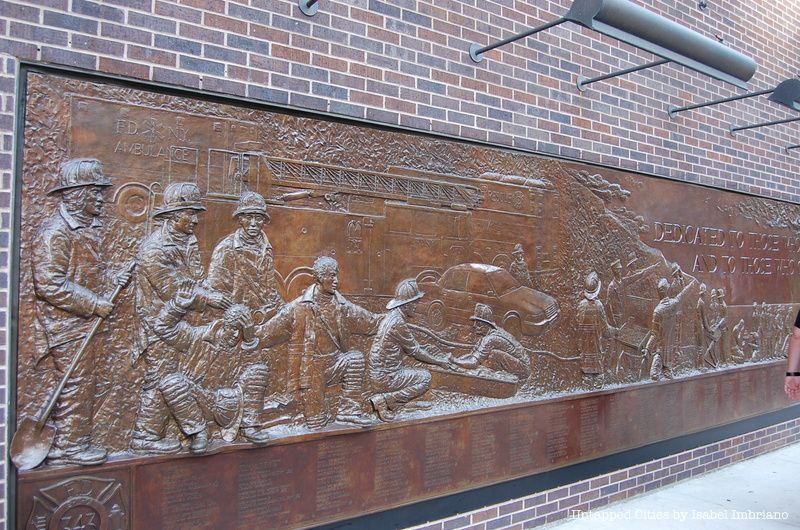
Close to the World Trade Center site is the ladder company of some of the very first responders. Firefighters from Ladder & Engine 10 who gave their lives on September 11th are immortalized on this 56-foot bronze sculpture, a common stop for visitors on their way to see 1 WTC and other parts of Memorial Plaza.
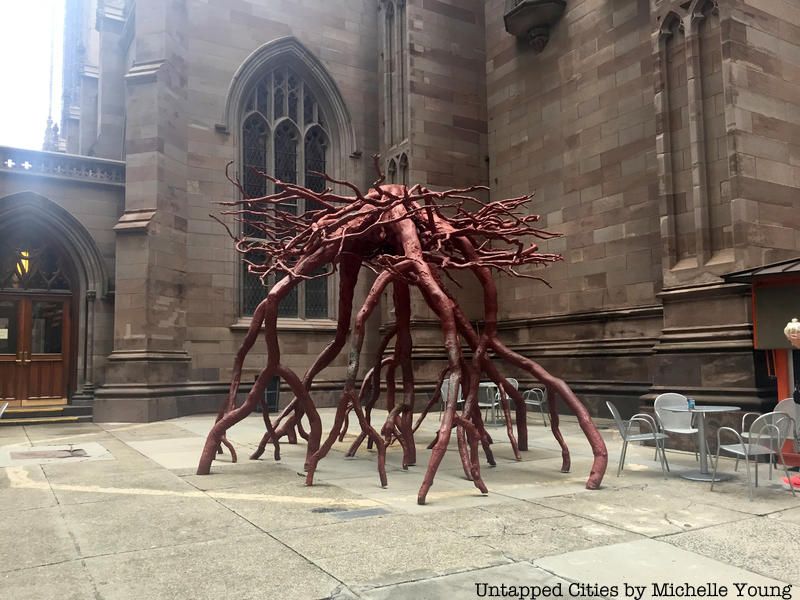
Artist Steve Tobin created a bronze cast from a remaining stump and root of a 70-year-old sycamore tree that shielded St. Paul’s Cathedral from falling debris on 9/11. It was installed in the courtyard of Trinity Church. Said the artist, “This sculpture is about the power of the unseen and the strength beneath the surface. It’s really not about a tree. When you look at this piece and look away, I would hope that people think about things that are not visually apparent.” However, in mid-2015, amidst some controversy, the sculpture was moved by Trinity Church to Connecticut and damaged in the process.
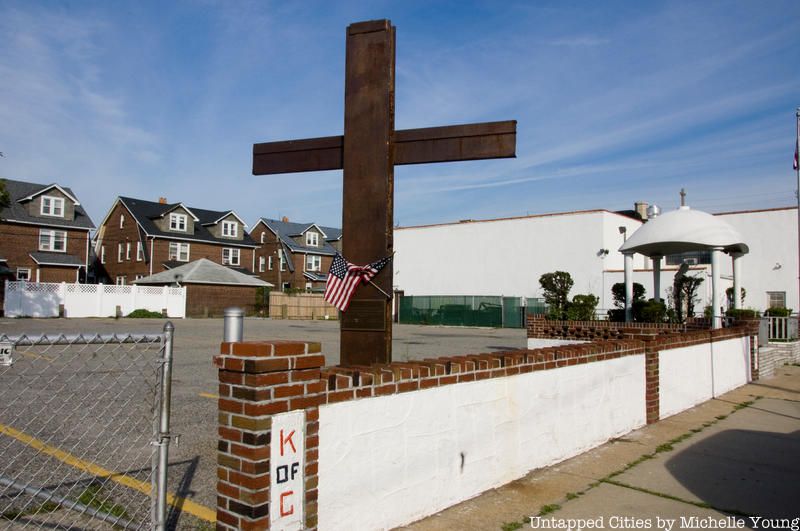
We recently covered another cross from the World Trade Center rubble located in a parking lot in Rockaway Beach, Queens. It may be in a seemingly random spot, but it invokes the memory of September 11th nonetheless, especially as it is visually similar to the Ground Zero Cross. It was donated by the New York City Department of Sanitation to the local Knights of Columbus chapter and erected at the site on Beach 90th close to Jamaica Bay.
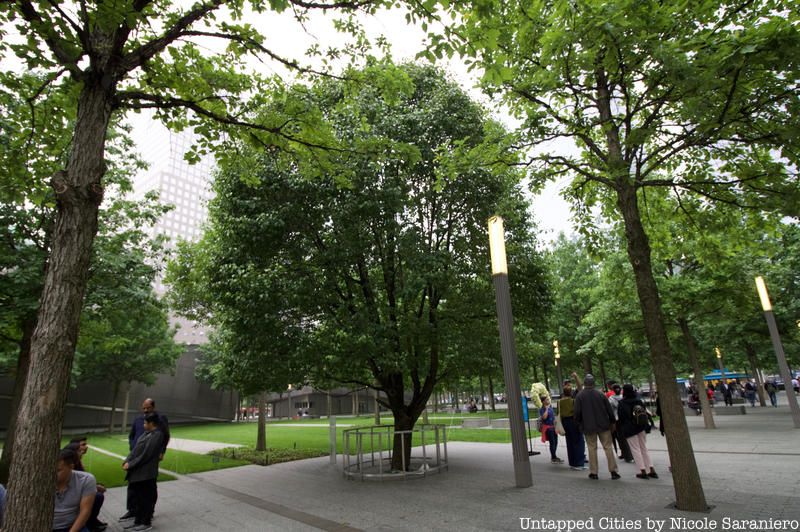
The Survivor Tree in Memorial Plaza is easily one of the largest trees in the memorial.
Within the Memorial Plaza, where visitors can view the reflecting pools at the current World Trade Center Memorial, stands the Survivor Tree, which we’ve covered before. It is a Callery pear tree that survived the attacks on 9/11, and was worked into the design of the Memorial Plaza. Workers managed to free it and nurse it back to health in a Bronx park before replanting it again in Memorial Plaza. Survivor Tree, now standing at about thirty feet, approximately four times its original height back in 2001, easily towers over the other trees planted in the Plaza. Visitors flock around the tree–a living and breathing reminder that we must grow and move forward after these events, as its limbs bear the scars of the Towers.
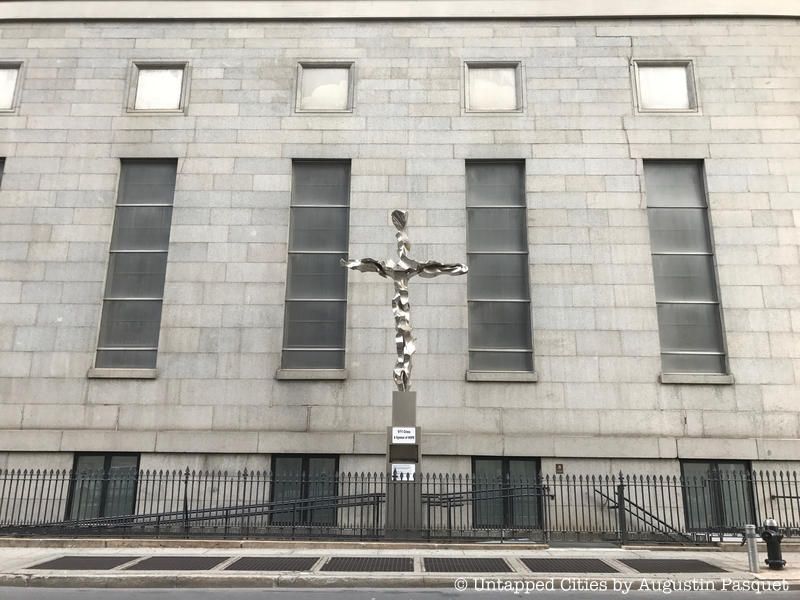
The iconic “Ground Zero Cross,” a group of steel beams in the shape of a cross from the rubble of the World Trade Center, was quite possibly the very first shrine after the attacks. From around the time it was found at Ground Zero, those with access used the cross as a place to leave flowers, notes, and pictures of loved ones. As the site was being cleared, the cross was moved to St. Peter’s Church, which faces Ground Zero. When the new 9/11 Memorial Museum opened, it was relocated as part of the museum’s exhibits but a new cross was installed:

The Sphere once stood in between the North and South Towers at the original World Trade Center.
The Sphere is a bronze sculpture by Franz Koenig that once stood in the Tobin Plaza between the Twin Towers at the World Trade Center. After the attacks on September 11th, the Sphere was recovered from the rubble and relocated to Battery Park near the Hope Garden but was moved back in 2017 to the World Trade Center site at Liberty Park. It accompanies an Eternal Flame that was lit on the first anniversary of the attacks. The plaque reads: “It was damaged during the tragic events of 11 September 2001, but endures as an icon of hope and the indestructible spirit of this country. The Sphere was placed here on 11 March 2002 as a temporary memorial to all who lost their lives in the terrorist attacks at the World Trade Center.”
In 2017, the Sphere made a triumphant return back to the World Trade Center
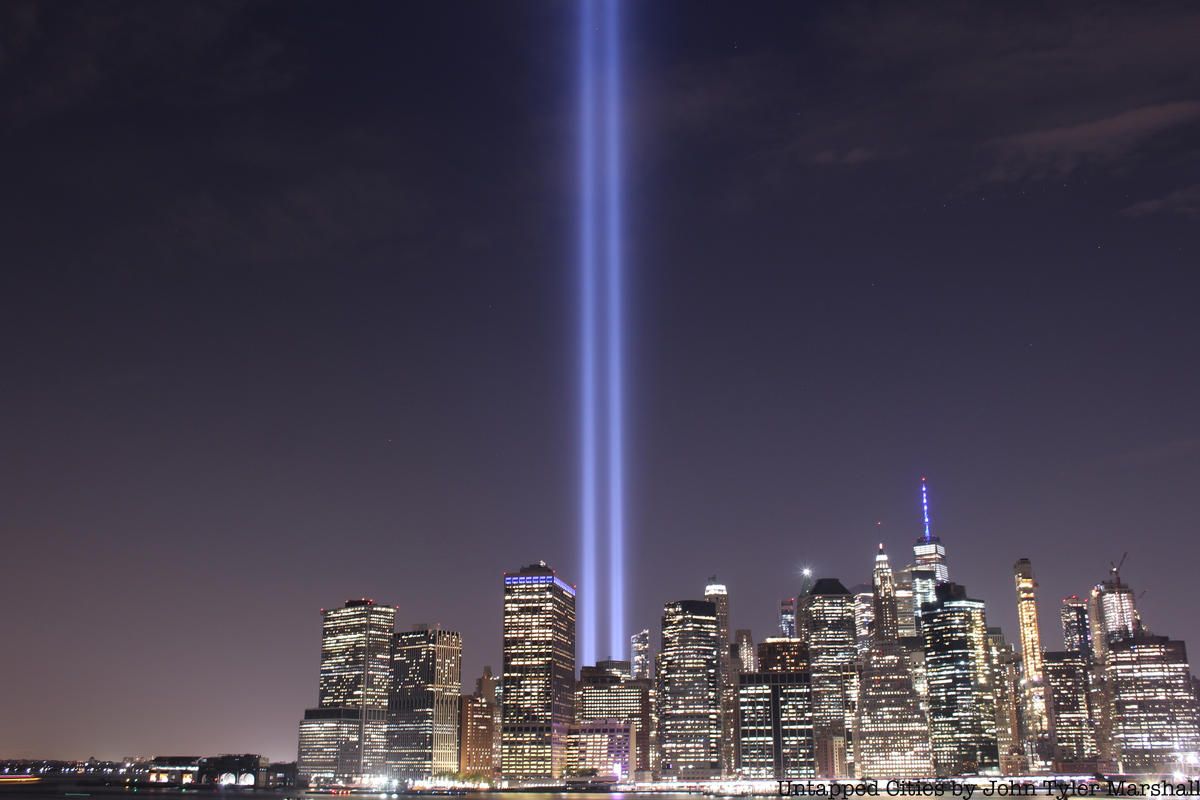
An important part of the 9/11 memorial ceremonies is the Tribute in Light. On the night of September 11th every year (so far), an art installation of 88 searchlights is set up in Ground Zero and flashed toward the sky as a tribute of the towers that once stood. This year’s lights will turn on at sunset on 9/11, ending sunrise the next day. These lights can be seen from as far as 60 miles away on a clear night, a beacon to all those who were affected by the attacks. The tribute has seen a lot of controversy, including several termination dates, but ultimately the installation remains a major spectacle of New York City’s ceremonies on this date. We previously went behind-the-scenes into the installation of the famous lights, with photos here.
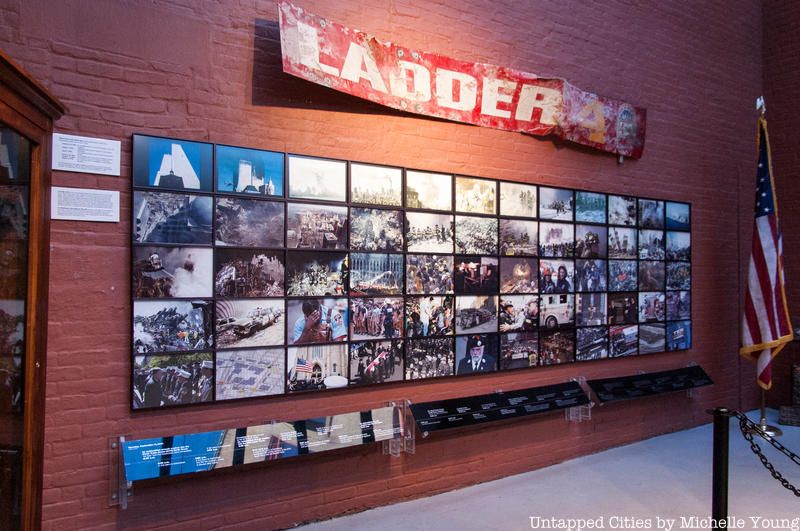
Inside the lesser-known NYC Fire Museum are numerous relics from the World Trade Center attacks, including fire engine signs, steel from the buildings, helmets and gear from fallen firemen, and Nikon camera that had been lost and recovered, with all the photos intact.
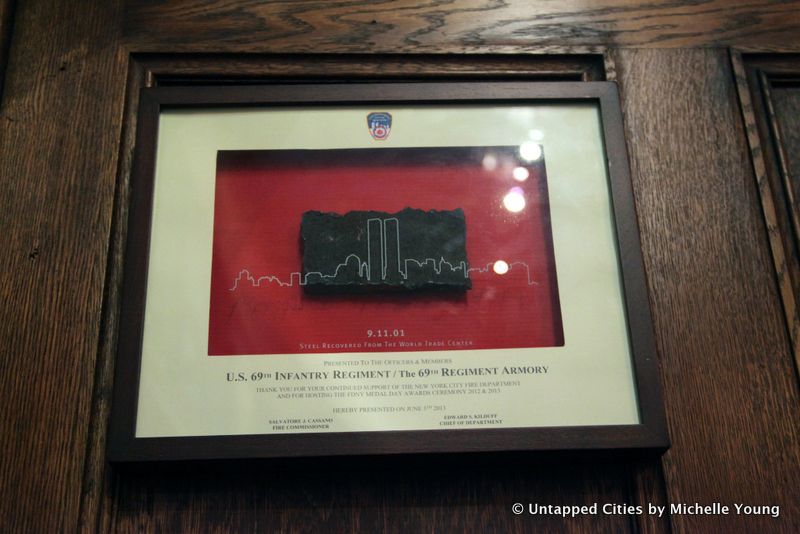
The 69th Infantry Regiment, popularly known as the “Fighting Irish,” were one of the first responders at 9/11, going in against orders. A piece of steel is framed inside the Garryowen Club, a private bar in the infantry’s regiment on Lexington Avenue.
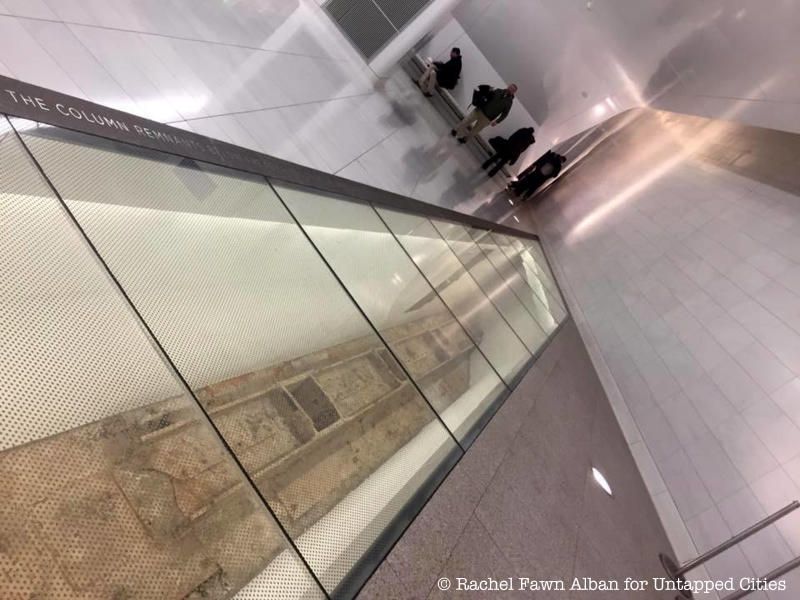
Skanksa built both the original World Trade Center and the new Transportation Hub, designed by Santiago Calatrava. In the new station, there was a deliberate move to also remember what happened on 9/11. To that end, the design has made visible the sections of the original steel framework and concrete foundation of the Twin Towers. You can see these sections under glass on the platform of the PATH station.
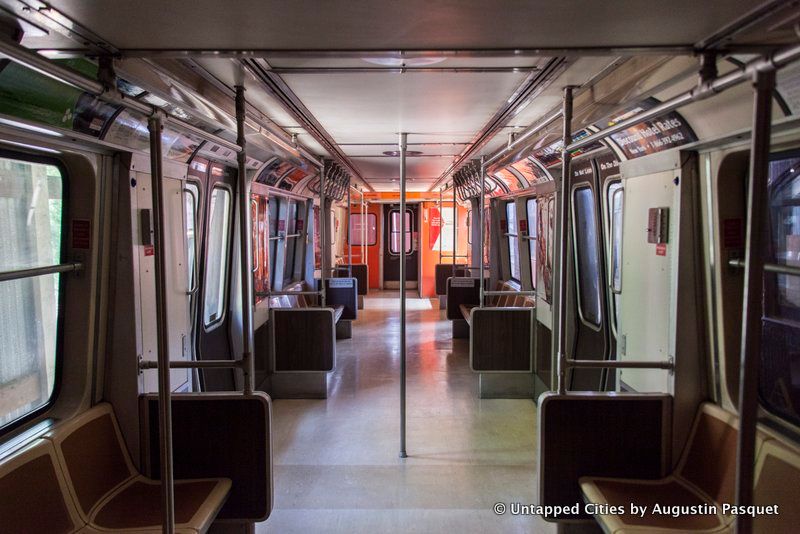
On September 11, 2016, two PATH cars from the train that was found beneath the World Trade Center site will be open to the public for the first time at two different trolley museums: The Shore Line Trolley Museum and the Kingston Trolley Museum. This PATH train was ordered to be evacuated before the Twin Towers fell. Most of the train was found destroyed, but two cars remained intact and were given to the two trolley museums in 2015.
Subscribe to our newsletter